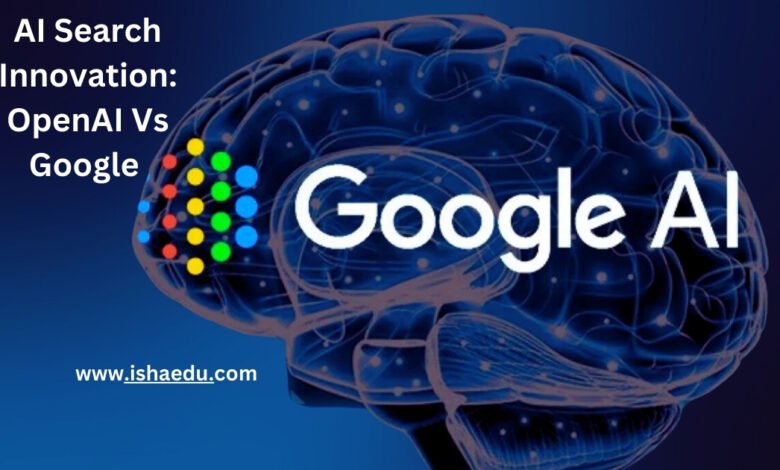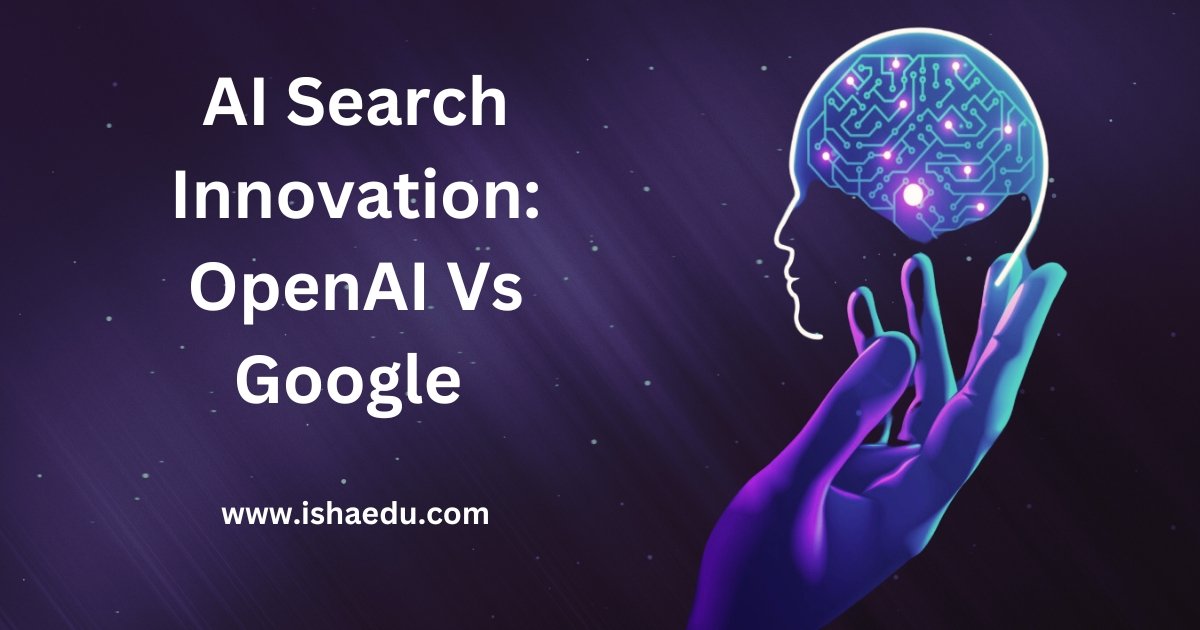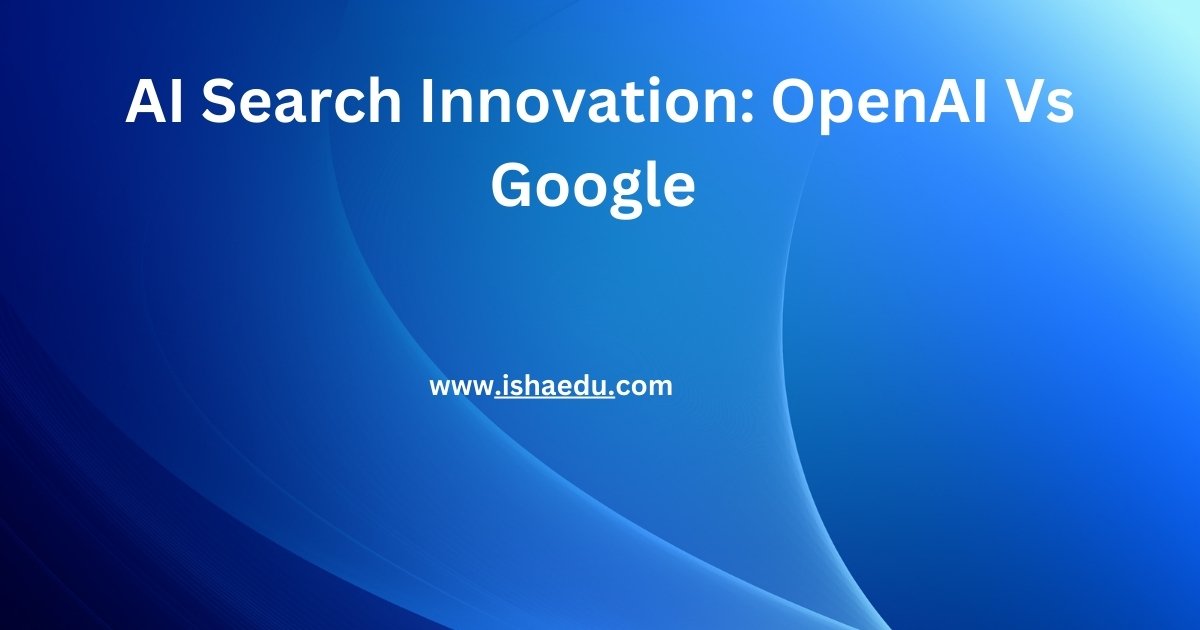AI Search Innovation: OpenAI Vs Google

AI Search Innovation: OpenAI Vs Google
The landscape of online information retrieval stands on the brink of a seismic shift, poised for a profound transformation driven by artificial intelligence (AI). In this unfolding narrative of innovation, two tech titans, Google and OpenAI, emerge as vanguards, each shaping the future of search in its unique way.
Google: The Esteemed Trailblazer
For decades, Google Search has reigned supreme as the quintessential online search platform. Its ascendancy is underpinned by a sophisticated framework of algorithms adept at parsing websites and user queries to furnish pertinent results. Google’s relentless pursuit of excellence sees it continually refining its algorithms, incorporating novel AI methodologies to enhance search precision and user experience. Endowed with an extensive reservoir of data and computational prowess, Google perpetually explores and enhances its search functionalities.
OpenAI: The AI Vanguard
In a departure from conventional paradigms, OpenAI, a research bastion committed to the cultivation of safe and beneficial AI, charts an alternative course. Its search engine harnesses the capabilities of large language models (LLMs) such as ChatGPT, endowed with a profound understanding of natural language. This affords OpenAI’s search engine the potential to deliver results imbued with intuitive finesse, transcending mere keyword matching. OpenAI’s emphasis on collaborative openness and AI safety portends a search experience characterized by transparency and reliability.
The Dawn of AI-Powered Search
The burgeoning rivalry between Google and OpenAI heralds an epochal shift in AI-driven search. Envision the following contours of this transformative landscape:
- Enhanced Natural Interactions: AI-driven search engines adeptly decipher complex queries expressed in natural language, akin to conversing with a knowledgeable companion. Imagine posing inquiries like “What are the environmental ramifications of diverse packaging materials?” and receiving tailored, informative responses tailored to individual requirements. Picture seeking travel advice and receiving bespoke itineraries tailored to preferences, budget, and travel inclinations.
- Deeper Understanding of Intent: Beyond mere keywords, AI-powered search engines discern the underlying intent behind a query, culminating in more germane outcomes. This entails not only furnishing factual elucidations but also proffering insights and diverse perspectives on a subject matter. For instance, a historical inquiry might yield analyses from disparate historians alongside primary source materials, enriching the informational tapestry.
- Dynamic Result Evolution: AI has the potential to dynamically recalibrate search outcomes based on user search history and predilections, engendering a personalized browsing milieu. This feature proves invaluable for intricate research endeavors and papers.
Challenges and Forward Trajectory
The evolution of AI-powered search is still in its nascent phase, beset by challenges ranging from bias mitigation to data privacy and information accuracy. It behooves both Google and OpenAI to navigate these hurdles conscientiously, ensuring the integrity and reliability of their search platforms. Crucially, the specter of issues like misinformation and filter bubbles looms large, necessitating robust strategies for mitigation.
Yet, amidst these challenges lie boundless opportunities. AI-driven search holds the promise of revolutionizing how we perceive and engage with online information, fostering efficiency, intuitiveness, and personalization. Moreover, it serves as a gateway to novel modes of learning and exploration, envisioning a search engine not merely as an oracle of answers but as a guide in the pursuit of knowledge, nurturing critical thinking skills, and fostering intellectual curiosity.

FAQs
Is OpenAI better than Google?
Google and OpenAI are both major players in AI search but with different approaches. Google excels in established search with vast data, while OpenAI focuses on natural language and user experience. Think of Google Search as a giant library with a great filing system, and OpenAI Search as a smaller, curated library with helpful librarians.
What is the best AI search engine?
AI search is still evolving, with Google and OpenAI offering different strengths. Google excels at finding info with its vast data, while OpenAI focuses on natural language understanding for a more user-friendly search.
Which is better, AI or Google?
AI and Google are different. AI is a technology used in many things, including search engines. Google is a company that uses AI to create products like their search engine. It’s like the difference between an engine and a car company that uses engines.
Does Google use AI for search?
Yes, Google Search uses AI to understand your searches and return better results.
Will Google or OpenAI win?
It’s too early to say who will win between Google and OpenAI in AI search. Both have strengths, and their competition will likely benefit users by creating better search experiences.
Can Google compete with OpenAI?
Google has the resources to compete effectively with OpenAI in AI search. Their experience and vast data holdings make them a strong player. The competition between these two tech giants is likely to benefit users in the long run.
Is Elon Musk against OpenAI?
Elon Musk co-founded OpenAI but left due to disagreements about its direction. There have been tensions about its focus on safety and its business model.

مصنوعی ذہانت سے چلنے والی تلاش (سرچ) کی جدت:
گوگل: تجربہ کار رہنما
کئی دہائیوں سے، گوگل سرچ انٹرنیٹ پر تلاش (سرچ) کا سب سے اہم پلیٹ فارم بن کر حکومت کر رہا ہے۔ اس کی برتری ایک پیچیدہ الگورتھم فریم ورک پر مبنی ہے جو ویب سائٹس اور صارفین کے پوچھے گئے سوالات کا تجزیہ کر کے متعلقہ نتائج فراہم کرتا ہے۔ گوگل مسلسل اپنی برتری کو برقرار رکھنے کے لیے کوشاں ہے، نئے AI طریقوں کو شامل کرکے تلاش (سرچ) کی درستگی اور صارف کے تجربے کو بہتر بناتا ہے۔ وسیع ڈیٹا اور کمپیوٹنگ کی صلاحیت سے لیس، گوگل مسلسل اپنی تلاش (سرچ) کی خصوصیات کو تلاش اور بہتر بناتا ہے۔
OpenAI: مصنوعی ذہانت کا علمبردار
روایتی نمونوں سے ہٹ کر، OpenAI، جو محفوظ اور فائدہ مند مصنوعی ذہانت (AI) کی ترقی کے لیے وقف ایک تحقیقی ادارہ ہے، ایک متبادل راستہ اختیار کرتا ہے۔ اس کا سرچ انجن بڑے لینگویج ماڈلز (LLMs) کی صلاحیتوں کا فائدہ اٹھاتا ہے جیسے ChatGPT، جو عام بول چال کی زبان کو بہت اچھی طرح سمجھتا ہے۔ یہ OpenAI کے سرچ انجن کو صرف کیورڈز سے مماثل نتائج فراہم کرنے سے آگے جانے کی صلاحیت دیتا ہے، بلکہ زیادہ فطری اور آسان نتائج فراہم کرتا ہے۔ OpenAI کا تعاون پر مبنی کھلے پن اور مصنوعی ذہانت (AI) کی سلامتی پر زور شفافیت اور اعتبار پر مبنی تلاش (سرچ) کے تجربے کی نشاندہی کرتا ہے۔
مصنوعی ذہانت سے چلنے والی تلاش (سرچ) کا دور
گوگل اور OpenAI کے درمیان ابھرتی ہوئی مقابلہ بازی AI سے چلنے والی تلاش (سرچ) میں ایک اہم تبدیلی کا آغاز ہے۔ اس بدلتے ہوئے منظرنامے کی وضاحت اس طرح ہے:
• بہتر فطری روابط: AI سے چلنے والے سرچ انجن پیچیدہ سوالات کو سمجھنے میں ماہر ہوتے ہیں جو عام بول چال کی زبان میں پوچھے جاتے ہیں، جیسے کسی جاننے والے سے بات کرنا۔ ایسا تصور کریں کہ آپ “مختلف قسم کی پیکجنگ کے ماحول پر کیا اثرات پڑتے ہیں؟” جیسے سوالات پوچھتے ہیں اور آپ کو اپنے مخصوص سوالات کے جواب میں درست اور معلوماتی جوابات ملتے ہیں۔ سفر کے مشورے تلاش کرنے اور اپنی پسند، بجٹ اور پسند کے مطابق بنائے گئے سفر کے منصوبے موصول ہونے کا تصور کریں۔
• ارادے کی گہری سمجھ: صرف کیورڈز سے آگے، AI سے چلنے والے سرچ انجن کسی سوال کے پیچھے چھپے ارادے کو سمجھتے ہیں، جس کے نتیجے میں زیادہ متعلقہ نتائج برآمد ہوتے ہیں۔ اس کا مطلب ہے کہ صرف حقائق بتانا ہی نہیں بلکہ کسی موضوع پر نئی روشنی اور مختلف نظریات پیش کرنا بھی شامل ہے۔ مثال کے طور پر، تاریخی تحقیق کے نتیجے میں مختلف مورخین کے تجزیے اور بنیادی ذرائع کی دستاویزات ایک ساتھ مل سکتی ہیں، جس سے معلومات کا دائرہ وسیع ہو جاتا ہے۔
• نتائج میں تبدیلی: AI کے پاس صارف کی تلاش کی تاریخ اور رجحانات کے پر تلاش کے نتائج کو فعال طور پر دوبارہ ترتیب دینے کی صلاحیت ہے، جس سے تلاش (سرچ) کا ایک ذاتی نوعیت کا ماحول بنتا ہے۔
اکثر پوچھے گئے سوالات:
کیا OpenAI گوگل سے بہتر ہے؟
گوگل اور OpenAI دونوں ہی AI تلاش (سرچ) میں اہم کردار ہیں لیکن ان کے طریقے الگ الگ ہیں۔ گوگل کے پاس بہت زیادہ ڈیٹا ہے اور وہ تلاش (سرچ) کے قائم مقام نظام میں ماہر ہے، جبکہ OpenAI عام بول چال کی زبان اور صارف کے تجربے پر توجہ مرکوز کرتا ہے۔ گوگل سرچ کو ایک بہت بڑی لائبریری کے طور پر سوچیں جس میں فائلوں کا بہترین نظام ہے، اور OpenAI سرچ کو ایک چھوٹی، منظم لائبریری کے طور پر سوچیں جہاں مددگار لائبریرین موجود ہیں۔
بہترین AI تلاش (سرچ) انجن کون سا ہے؟
AI تلاش (سرچ) ابھی بھی ترقی کر رہا ہے، گوگل اور OpenAI مختلف مضبوط qualties پیش کرتے ہیں۔ گوگل اپنے وسیع ڈیٹا کے ذریعے معلومات تلاش کرنے میں ماہر ہے، جبکہ OpenAI زیادہ صارف دوست تلاش (سرch) کے لیے عام بول چال کی زبان کو سمجھنے پر توجہ مرکوز کرتا ہے۔
AI یا گوگل، کون سا بہتر ہے؟
AI اور گوگل مختلف چیزیں ہیں۔ AI ایک ٹیکنالوجی ہے جو بہت سی چیزوں میں استعمال ہوتی ہے، جس میں تلاش (سرچ) انجن بھی شامل ہیں۔ گوگل ایک کمپنی ہے جو AI کا استعمال اپنے مصنوعات جیسے سرچ انجن کو بنانے کے لیے کرتی ہے۔ یہ اس فرق کی طرح ہے جو ایک انجن اور ایک کار کمپنی کے درمیان ہے جو انجنوں کا استعمال کرتی ہے۔
کیا گوگل تلاش (سرچ) کے لیے AI استعمال کرتا ہے؟
جی ہاں، گوگل سرچ آپ کی تلاش (سرچ) کو سمجھنے اور بہتر نتائج واپس کرنے کے لیے AI کا استعمال کرتا ہے۔
کیا گوگل یا OpenAI جیتے گا؟
ابھی یہ کہنا قبل از وقت ہے کہ AI تلاش (سرch) میں گوگل اور OpenAI کے درمیان کون جیتے گا۔ دونوں کمپنیوں کی اپنی اپنی مضبوطیاں ہیں، اور ان کا مقابلہ صارفین کو بہتر تلاش (سرچ) کے تجربات دے کر فائدہ مند ثابت ہوگا۔
کیا گوگل OpenAI کا مقابلہ کر سکتا ہے؟
گوگل کے پاس AI تلاش (سرچ) میں OpenAI کے ساتھ موثر مقابلہ کرنے کے لیے وسائل موجود ہیں۔ ان کا تجربہ اور وسیع ڈیٹا انہیں ایک مضبوط کردار بناتا ہے۔ ان دو ٹیکنالوجی کمپنیوں کے درمیان مقابلہ سے طویل عرصے میں صارفین کو فائدہ ہونے کا امکان ہے۔
کیا ایلون مسک OpenAI کے خلاف ہیں؟
ایلون مسک نے OpenAI کے شریک بانی تھے لیکن اس کی سمت کے بارے میں اختلافات کی وجہ سے چلے گئے۔ اس کی حفاظت اور اس کے بزنس ماڈل پر توجہ مرکوز کرنے کے بارے میں کشمکش چل رہی ہے۔

Join Us :
Click Here To Get Technology And Entertainment Notification:




